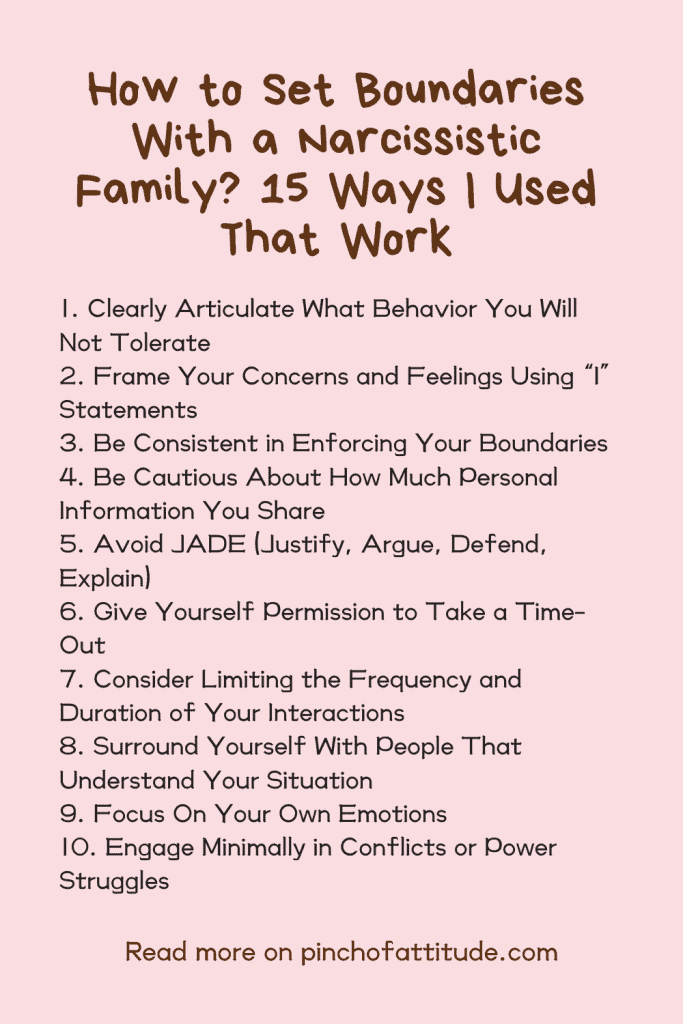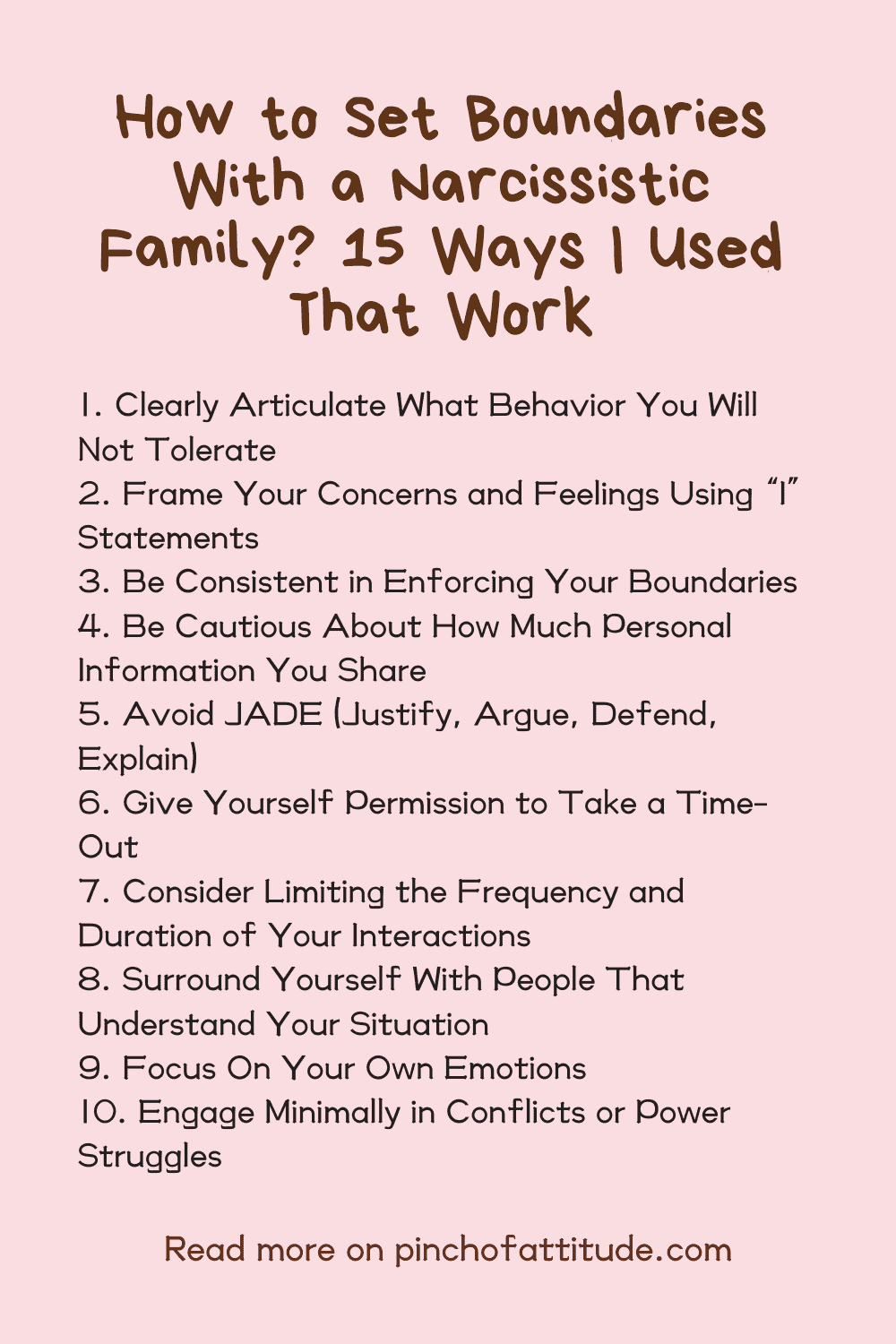Ever felt like your family’s needs and expectations always trump your own? Like your voice doesn’t matter, or that you’re constantly walking on eggshells to avoid their disapproval?
I get it. My own journey has been a rollercoaster of success, toxic ties, and the quest for sanity. Sibling rivalry, parental expectations, you name it. Oh! I’ve got stories to share.
But more than sharing stories, I’m here to answer a very important question: how do you set boundaries with a narcissistic family member?
After all, establishing boundaries is the first step towards protecting yourself from their manipulative behavior.
- Clearly state boundaries without extensive justification. Learn to love the challenge, safeguarding your peace and controlling your narrative.
- Focus on your emotions, minimize conflicts whenever you can, and have a good understanding of those who wronged you.
- If setting boundaries is challenging, seek professional guidance. Develop coping skills and safeguard your mental health.
Table of Contents
How to Set Boundaries With a Narcissistic Family?

Having weathered the storm of gaslighting and the toll it took on my emotional health, I’ve learned more than a thing or two about safeguarding my well-being.
My narcissistic mother had a way of making me doubt what I knew was true, and it really messed with how I felt inside.
That’s when I figured out that I needed to do something.
Here are the 15 ways that I personally used to set boundaries with my narcissistic family which helped me take charge, feel good about myself, and most importantly, stay strong against my manipulative mother:
1. Clearly Articulate What Behavior You Will Not Tolerate
Trying to set boundaries with narcissistic parents is like drawing a line in the sand and saying, “This far, no further.”
It’s no walk in the park, I know, but put your foot down and make it clear what behaviors you won’t put up with anymore.
It’s a self-preserving act, a declaration that you won’t let hurtful words or mind games infiltrate your space.
Embrace the challenge, for in drawing this line, you’re not just safeguarding your peace. You’re also reclaiming control over your narrative.

2. Frame Your Concerns and Feelings Using “I” Statements
This is a powerful tool when dealing with someone with narcissistic personality disorder.
Instead of pointing fingers, using “I” statements allows you to express your feelings and concerns from your perspective.
For instance, you might say, “I feel hurt when certain comments are made.” It’s not about blaming but about sharing your emotions.
Individuals with narcissistic tendencies may try to deflect or manipulate, but “I” statements keep the focus on your experience. This makes it harder for them to dismiss your feelings.
3. Be Consistent in Enforcing Your Boundaries
In the past, you might have been made to believe you don’t deserve to have boundaries. I know I was, and that’s why it’s important to be consistent.
Simply voicing your boundaries may not be enough because a narcissist might test your resolve. They may challenge your limits, attempting to push past the lines you’ve drawn.
By enforcing your limits consistently, you send a clear message that your needs and well-being matter.
It’s a way of reclaiming your autonomy and reinforcing the importance of respecting your established boundaries.
4. Be Cautious About How Much Personal Information You Share
A narcissist doesn’t operate by the same rules of empathy and respect for privacy.
Sharing too much can provide them with ammunition, allowing them to use personal details to manipulate or control you.
That’s why you have to gauge what information makes you uncomfortable or upset when shared.
By exercising caution and controlling the flow of personal information, you maintain a level of protection against potential manipulation.
Striking a balance between openness and self-protection becomes key in maintaining a healthy boundary.

5. Avoid JADE (Justify, Argue, Defend, Explain)
When you set boundaries with narcissists, you can expect them to retaliate and challenge your decision.
Justifying, arguing, defending, or explaining your decisions opens the door for manipulation, draining your mental and emotional health.
Instead, stand firm without feeling compelled to provide exhaustive justifications.
By avoiding JADE, you assert your limits confidently and protect your well-being in the process.
Remember, your boundaries are valid simply because they are yours. You don’t owe anyone a detailed defense of your choices.
6. Give Yourself Permission to Take a Time-Out
It’s important to learn that your needs, including the need for a break, are valid.
Narcissists often disregard or undermine these needs. But when interactions become overwhelming or emotionally taxing, giving yourself a time-out is a powerful act of self-care.
It allows you to step back, recharge, and regain perspective.
Take a breather. It’s not about giving in but a strategic pause to protect your mental and emotional well-being.

7. Consider Limiting the Frequency and Duration of Your Interactions
Narcissists enjoy pushing boundaries and might ignore your own wishes.
By setting limits on how often and how long you engage, you protect yourself from being consistently subjected to their unhealthy behavior.
People conditioned to accept unhealthy behavior from narcissists may find it challenging to break the cycle, but it’s a crucial step in breaking free from their narcissism.
It’s not about avoidance but creating space for your mental and emotional health.
8. Surround Yourself With People That Understand Your Situation
Not everyone will be able to comprehend the intricacies of dealing with narcissists, and if they’re your parents, it can be even more challenging.
People might inadvertently encourage toxic behaviors or label you as “acting like a victim.”
But I learned from experience that building a support network of those who grasp the complexities provides validation.
It’s about building connections with individuals who empathize with your experiences, offering genuine understanding and encouragement.
This supportive circle helps you feel less isolated in your journey.
9. Focus On Your Own Emotions
When you’re raised by a narcissist, the focus is almost always skewed toward their needs, neglecting your own.
That’s why you have to learn how to shift that focus onto your own emotions for the sake of your mental health and wellness.
By acknowledging and understanding your feelings, you break free from the cycle of constantly reacting to the narcissist’s demands.
This shift helps you regain control over your emotional well-being, allowing you to build a healthier relationship with yourself.
In the grand scheme of things, prioritizing your emotions becomes a pivotal step in your journey towards personal growth and resilience.
10. Engage Minimally in Conflicts or Power Struggles
Narcissists thrive on control and may intentionally provoke conflicts to exert dominance. By minimizing your involvement, you disrupt their pursuit of power and control.
Growing up, my mother often tried to escalate situations by hurling insults, and seeking reactions that reinforced her sense of superiority.
By limiting my interactions with her, I was able to deny her the satisfaction of achieving this goal.
It’s not about avoiding conflicts altogether but rather disengaging strategically to protect your well-being.
This approach prevents the emotional toll that often accompanies power struggles, allowing you to maintain a healthier emotional balance in the relationship.

11. Respond to Provocations With Neutral Statements
Narcissists tend to exploit heightened emotions, using them to manipulate or take advantage of others.
Neutral responses disrupt this cycle, preventing them from leveraging emotional reactions for their benefit. It’s about maintaining composure, not falling into their emotional traps.
You’re able to set boundaries when you strategically respond in a way that safeguards your emotional well-being while thwarting their attempts to manipulate the situation.
12. Recognize and Avoid Responding to Baiting Attempts
A narcissistic parent likely attempts to bait you into arguments or provoke emotional reactions to maintain control.
Baiting attempts could involve criticism, manipulation, or intrusive comments, like telling you how to parent your children.
By recognizing these maneuvers and choosing not to engage, you disrupt their cycle of control.
Safeguard your emotional well-being by refusing to be drawn into situations designed to provoke emotional responses.
This approach maintains your autonomy and helps establish healthier boundaries in the relationship.
13. Engage in Activities That Promote Your Well-Being and Mental Health
Prioritizing self-care is important for maintaining overall well-being and mental health, especially when it comes to dealing with a narcissistic family member.
Narcissists often create stressful environments, and focusing on activities that bring you joy and relaxation becomes a crucial form of self-preservation.
Set time for activities that nourish your soul, whether it’s reading, exercising, or spending time with supportive friends.
Investing in your well-being helps build resilience, maintaining a sense of balance amidst the complexities of such relationships.
14. Establish Clear Consequences for Boundary Violations
Narcissists may intentionally cross the line to test the strength of your boundaries. They often manipulate situations and, if allowed, will take advantage.
When you set consequences and don’t let things slide, you communicate that certain behaviors won’t be tolerated.
Being firm in your response prevents them from thinking they can get away with crossing boundaries.
So, don’t beat around the bush. Instead, send a clear message that there are repercussions for pushing limits.

15. Seek Professional Support if You Can’t Do It Alone
Seeking professional support is important to learn how to set boundaries with a narcissistic parent and develop healthy coping skills.
Professionals can guide you in safeguarding your mental health to better learn how to manage the effects of the abuse.
It is a proactive step towards healing and empowerment, where you can explore strategies tailored to your unique situation.
Why Is It Important to Set Boundaries With Your Narcissistic Family?

Setting boundaries when dealing with a narcissistic parent is important for maintaining emotional well-being.
Without clear limits, narcissistic family members may exploit your vulnerabilities, causing profound emotional distress.
Narcissists often have a sense of entitlement and lack empathy, making it difficult for them to respect the boundaries of others.
They may manipulate, criticize, or belittle you in order to maintain control and inflate their own self-esteem. This can lead to feelings of guilt, shame, and low self-worth in the victim.
By setting boundaries, you can protect yourself from these harmful narcissistic traits and start to rebuild your emotional well-being.
Boundaries help to define what is acceptable and unacceptable behavior, and they communicate to the narcissist that you will no longer tolerate their manipulative tactics.
The Effects of Growing up With Unhealthy Boundaries
Growing up without healthy personal boundaries can have profound and lasting effects on a person’s emotional and psychological well-being.
When consistently allowed to violate your boundaries, you also let the narcissist blur your sense of self. This can lead to a range of negative consequences, including:
- Difficulty forming healthy relationships: Without a clear understanding of boundaries, you may become overly trusting, easily manipulated, or have unhealthy expectations in relationships.
- Low self-esteem and self-worth: When boundaries are constantly crossed, it’s possible for individuals to feel unworthy of respect and love, leading to feelings of shame and worthlessness.
- Inability to say no: Persons who grow up without healthy boundaries may have difficulty expressing their needs and saying no to others. This can lead to feelings of resentment, anger, and frustration.
- Codependency: In an attempt to gain approval or avoid conflict, you may become overly dependent on others for your self-worth. This can lead to codependent relationships, where you prioritize the needs of others over your own.
- Difficulty expressing emotions: Emotional boundaries are important for managing and expressing emotions in a healthy way. Without clear emotional boundaries, you may suppress your emotions or have difficulty regulating your emotional responses.
- Vulnerability to manipulation and abuse: Individuals who grow up without healthy boundaries may be more susceptible to manipulation and abuse. They may be more likely to stay in unhealthy relationships or tolerate disrespectful behavior.
- Difficulty making decisions: Without a clear sense of self and personal boundaries, you may struggle to make decisions that align with your values and needs. You may seek validation or approval from others before making choices.
- Physical and mental health issues: The stress and emotional distress caused by boundary violations can lead to a range of physical and mental health problems, including anxiety, depression, and chronic pain.
Growing up with unhealthy boundaries can shape how others see you as an individual, but don’t let a narcissist’s influence define your sense of self.
Take charge of your narrative by actively working to establish and enforce healthy boundaries, allowing your true identity to emerge beyond the constraints of manipulative dynamics.
It’s Not Too Late to Create Boundaries in Your Adulthood
Even if you grew up in an environment without clear boundaries, it’s never too late to start establishing them now.
As an adult, you have the power to define what is acceptable and unacceptable behavior in your relationships, including with your parents.
You may find it challenging, especially if you’ve always been accustomed to putting their needs above your own. But you are an adult now, and you have the right to protect your own well-being.
It doesn’t mean abandoning them or denying them love and support. It simply means communicating your needs and expectations clearly and assertively.
When you establish clear boundaries, you send a message that you are no longer willing to tolerate disrespect, manipulation, or behavior that compromises your emotional well-being.
This may initially cause conflict or resistance, but it can lead to a healthier and more fulfilling relationship in the long run.

Related Posts:
- How to Protect Yourself From Narcissistic Family Members? My Personal Advice
- How to Escape a Narcissistic Family? My Guide to Your Safety
- What Happens When You Go No Contact With a Narcissistic Family? I Was in Heaven!
- Narcissist Family: Signs, Effects, and How I Succeed in Toxic Environment
- Narcissistic Family Structure: How Was It Like for Me Living Under One?
Frequently Asked Questions
How do you know which boundaries to set with your narcissistic family?
Determine what behaviors you find unacceptable and communicate them clearly. Be prepared to enforce consequences if boundaries are violated.
How do you detach from a narcissistic family?
Detaching from a narcissistic family involves setting clear boundaries, seeking support, and prioritizing your mental well-being.
What to do if your narcissistic parents don’t respect your boundaries?
Enforce consequences consistently when boundaries are violated. Seek support from trusted friends, family members, or therapists.
How does a narcissist feel when you set boundaries?
Narcissists typically feel threatened or angry when boundaries are set because it challenges their sense of control. They may try to manipulate or guilt you into dropping the boundaries.
Do narcissists get mad when you set boundaries?
Yes, narcissists often get mad when you set boundaries. This is because when you set boundaries, you are essentially telling them that you are no longer willing to tolerate their manipulative behavior.
Do narcissists respect people with boundaries?
No, narcissists typically do not respect people with boundaries. They may initially appear to respect your boundaries, but they will eventually try to manipulate you into crossing them.




